Empathy, Equity… Shall we end this Zero-Sum Game?
What if our biggest barrier to achieving gender equity isn’t just policy or prejudice but the absence of perspective? At the We Are GLOBAL Women conference hosted by Anglia Ruskin University, one theme echoed across every panel, story, and statistic: empathy, particularly perspective-taking, is a powerful yet underused tool for societal transformation. This insight resonates deeply with our mission at Cognitive Humanity, where we believe that cultivating empathy at scale, personalised, measurable, and dynamic, is the key to lasting behavioural change in workplaces and beyond.
The Science
The concept of equity is more than fairness; it’s a psychological contract. As outlined in the Equity Principle, people assess fairness not just by outcomes, but by the ratio of what they give and receive. Inequity breeds distress. In gendered contexts, this distress often manifests in both overt and subtle ways—from women receiving less feedback, mentorship, or stretch projects, to men experiencing poorer mental health outcomes in rigidly masculine environments.
But what transforms inequity into empathy-driven action? The answer lies in perspective-taking, the ability to temporarily inhabit another’s reality. Research in social psychology supports that empathy, especially cognitive empathy (seeing the world from another’s perspective), reduces stereotyping and biases, fosters moral reasoning, and enhances cooperation.
Professor Magdalena Zawisza’s global study across 62 countries ("Towards Gender Harmony") adds statistical backbone to this claim. Hostile sexism negatively correlates with national outcomes like democracy, peace, and health. Societies that rank higher in egalitarianism experience greater happiness, stronger economies, longer life expectancy, and, yes, happier romantic relationships.
Key Findings
From the conference, several patterns emerged:
Sexism is bad for everyone. It’s not just a women's issue. Men in patriarchal societies have higher risks of depression, suicide, and even violent death.
Perspective-taking fosters empathy and allyship. One speaker, Lee Chambers, described how attending a mother-baby group as the only man helped him realise the subtle discomfort of being the “other.” This discomfort, he says, was the beginning of growth.
Equity isn't about shrinking someone else’s pie. It's about expanding the pie for all. Inclusion is not a zero-sum game; it's a collective upgrade.
Workplace biases are still deeply entrenched. Women are more likely to be interrupted, excluded from social networks, and judged harshly, while men often don’t recognise their role in reinforcing exclusion. 81% of women feel some form of exclusion at work, and 92% of men don’t believe that they are excluding women.
Wellbeing and equity are inextricably linked. Countries with more equitable gender norms have better health outcomes for both men and women.
What Does This Mean?
For us at Cognitive Humanity, this is a clarion call. Our empathy assessments and development tools aren’t just about making workplaces kinder, they’re about making them smarter, fairer, and more effective. When organisations invest in perspective-taking, they don’t just create inclusion; they reduce attrition, increase trust, and drive innovation.
Our platform's foundation is built on the recognition that equity, like empathy, cannot be a one-size-fits-all approach. Just as people's perspectives differ, so must the way we build awareness, measure growth, and create change. Our empathy-led approach and personalised nudges aren’t just bells and whistles; they’re designed to restore and build felt equity in teams.
The We Are GLOBAL Women conference reminded us that emotional labour, cognitive bias, and workplace culture all intersect. If equity is the outcome, empathy is the method—and perspective-taking is one of the vital bridges.”
A Question to Reflect On
How often do you step into someone else’s world, not to fix or judge, but simply to feel?
Further Readings
Zawisza, M. et al. (2025). Towards Gender Harmony Dataset – 62-Country Study
Batson, C.D. (2009). These things called empathy: Eight related but distinct phenomena.
Equity Theory (Adams, J.S., 1965) – A foundational concept in social exchange theory.
Work With Me: The 8 Blind Spots Between Men and Women in Business – Barbara Annis & John Gray
WHO (2021). Reports on global gendered health expectancy.
Glick & Fiske’s Ambivalent Sexism Theory


